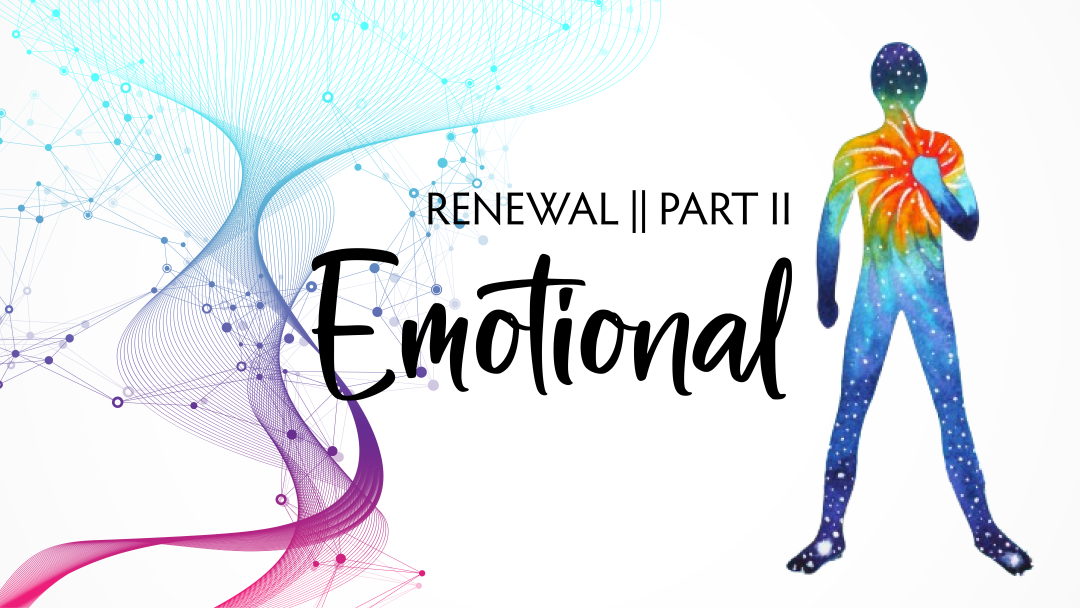
Well
This blog is taking a turn. I had begun working on it, but now it’s getting a redo. Hopefully, it all makes sense and comes together. I am writing this piece with a heavy heart. I guess in a way it’s fitting to write about renewing our emotions in the midst of the situation our family finds ourselves in. On New Year's morning, my nephew, Corey, had a massive heart attack. He was rushed to the hospital where they performed an emergency triple bypass surgery. The doctors told the family that the next three days were going to be critical. After performing numerous life-saving procedures, hundreds, probably thousands of prayers later, I sit here in the hospital typing that Corey passed away at 29 years old.
So, emotions … There is anger in the whys that go unanswered? The hurt in the loss. The tears in the midst of the sadness that we won’t have more time together. The smiles as we all surrounded him and shared our favorite things about him. The laughter from thinking about fond memories and sillier times. In all of it though, the overwhelming joy, that lies in the truth that Corey knew and loved Jesus. That, in the moment of his last breath, he passed from death into eternal life. Standing before our Lord and Savior, he got to hear the words, “Well done my good and faithful servant.”
If you’ve held on to this point, you’re probably wondering, just like me, where is this going? I guess my first thought centers around the truth that God created us in His likeness. He gave us emotions, but in our imperfection, we often struggle with handling and processing those emotions in the right way. Proverbs 29:11 reminds us that, “A fool gives full vent to his spirit, but a wise man quietly holds back.” As Carmelita so wonderfully reminded us in last week’s blog, when we put our faith in Jesus, our spirit becomes one with the Holy Spirit who lives in our hearts. It’s through His leading and guiding that we are able to truly live this out. In our own selves, we are easily overcome by our emotions, allowing them to get the best of us. It is only through our connection to the Holy Spirit that we can truly find the wisdom we need to process our emotions and walk through the struggles that life can bring. My hope in the next few paragraphs is to help you navigate what it looks like to be aware of our emotions and, then, transition from where we are emotionally, to where we hope to be.
Aware
We’ve all heard the expression “Don’t let your emotions get the best of you.” Scripture talks about this in James 1:19 where it says, “... let every person be quick to hear, slow to speak, slow to anger …”. Allowing our emotions to overcome us is where negative emotions, like anger or frustration, begin to manifest and can lead us to lash out at those around us. By slowing down to think about the things we’re feeling it helps us to process not just what we’re feeling, but the reason we feel that way. Emotional awareness like this is key when we’re striving for better emotional health. If you’re looking for a great read on emotional health, I’d encourage you to pick up Emotionally Healthy Spirituality by Pete Scazzero. In this book, Pete explores the importance of moving towards becoming emotionally healthy Christians in light of our spiritual relationship with God. There’s so much in the book, that I can’t begin to unpack it in this blog, but he does talk about the importance of being aware of our feelings by recognizing and naming our feelings.
In that vein, I completely agree with Pete that a person who can recognize and state those feelings is showing the early signs of an emotionally healthy person. At the very least they are putting themselves in a position to better navigate their emotions and handle them in a healthy manner, versus people who simply react to the way they feel. As a Care and Counseling Pastor, I speak with people all the time about their emotions as they navigate the difficulties of life. When I talk with someone who is struggling to process their emotions and make wise decisions, I often ask them what they feel when those tough moments are going on. Are you confused, sad, angry, frustrated, depressed, anxious, worried, or a mix of some? From there I’ll often ask what was happening before they felt that way and were they doing alright before that. After we talk about those things, I encourage them to take down some notes when these events happen, especially if they struggle with looking back to recognize and name their feelings. With this said, I understand that navigating our emotions is sometimes easier said than done and simply being aware of our emotions is not the endgame of emotional health.
Transition
Once we’ve got a solid grasp of where we are emotionally, the next step is transitioning to where we want to be. In Ecclesiastes 3, Solomon wrote, “For everything there is a season, and a time for every matter under the sun.” He goes on to mention a time to weep, mourn, laugh, dance, seek, lose, love, hate, to stay silent, and even a time to speak. While some of these statements are directly tied to an emotion we experience, some of them are geared more toward the actions we should take as we process our emotions. The key in all of this, as we mentioned before, is recognizing our emotions and processing whether that emotion is appropriate for the situation we’re facing.
It may seem obvious that being angry when someone hurts us and responding back to them out of anger is not the best way to handle things. What’s difficult is figuring out how to react differently. Every situation is different, so just because we don’t want to respond in anger, doesn’t mean we need to pick the opposite emotion and respond in a happy tone. It means that we need to know what the appropriate emotion is in a given situation. Maybe I need to be silent and listen to the person’s feelings and show empathy to them. On the other hand, we may be experiencing something that we’re extremely happy about and want to share, but the person we are with is going through a difficult situation of their own. We need to be able to put ourselves in their shoes and realize that it’s ok to be happy and talk with them, but it may not be the time to exuberantly share the joys you’re experiencing.
Lastly, being angry, frustrated, or upset are often seen as negative emotions. In reality, these emotions are real and valid emotions. When we’re hurt by something someone does or says to us, or even times we see someone else hurt, it’s okay to have these emotions. God hates. He hates sin. Jesus experienced sadness when He saw the pain in the people’s eyes when Lazarus died. Being emotionally healthy isn’t just knowing what emotions we’re feeling and being able to transition to the way we’d like to feel, it’s about being confident in walking through the emotions we need to experience.
Support
There’s so much more I could say about being emotionally healthy. Again, Pete Scazzero wrote an entire book on it. My hope in wrapping this up, is not to tell you exactly what to do. It’s your job to lean in on the Holy Spirit and listen to His leading in your emotions. It’s up to you to listen to the words you hear, or better yet, the responses you see from the people around you. What I will say though, is that sometimes we can be so lost in our emotions that we need help processing the things we’re experiencing. These are the moments where we need to ask for help. Whether you get connected with a counselor at the Bay Life Counseling Center, or somewhere else, (plug into a ministry like Breakthrough, or even a life group) the key is having the support you need to grow. God gave us our emotions to experience and when done right, not only allow us to be healthier emotionally, but mentally, spiritually, and physically as well.

